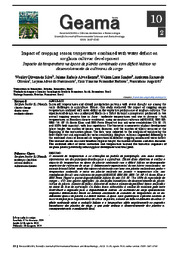Impact of cropping season temperature combined with water deficit on sorghum cultivar development.
Impact of cropping season temperature combined with water deficit on sorghum cultivar development.
Author(s): SILVA, W. O. da; BARROS, J. R. A.; SIMOES, W. L.; OLIVEIRA, A. R. de; NASCIMENTO, L. A. do; BARBOSA, K. V. F.; ANGELOTTI, F.
Summary: Increased temperatures and altered precipitation patterns with severe drought are among the main challenges in agriculture. Hence, this study evaluated the impact of cropping season temperature combined with water deficit on the vegetative performance of sorghum cultivars. The experimental design was randomized blocks in a 2x6x4 factorial arrangement, performed in two annual cropping seasons (one in June -moderate temperatures; and one in January -high temperatures, in Brazilian climate conditions), using six sorghum cultivars (AGRI002E, BRS 506, BRS 716, SF 15, Santa Elisa, and BRS Ponta Negra) at four soil water availabilities (25, 50, 75, and 100% field capacity), with four repetitions. The biometric assessments of plant development (plant height, the number of leaves, stem diameter, and the number of tillers) occurred at the beginning of the maturation phase. The data were subjected to the analysis of variance by the Scott-Knott test and regression for water availability. Sorghum cultivars responded differently to the combined stress of increased air temperatures in different cropping seasons and water deficit. The warmest season was more beneficial to plant height, the number of leaves, and stem diameter. The combined effect of water restriction and temperature harmed the biometric responses of sorghum plants, potentially reducing plant development and final yield.
Publication year: 2024
Types of publication: Journal article
Unit: Embrapa Semi-arid Region
Observation
Some of Embrapa's publications are published as ePub files. To read them, use or download one of the following free software options to your computer or mobile device. Android: Google Play Books; IOS: iBooks; Windows and Linux: Calibre.
Access other publications
Access the Agricultural Research Database (BDPA) to consult Embrapa's full library collection and records.
Visit Embrapa Bookstore to purchase books and other publications sold by Embrapa.

